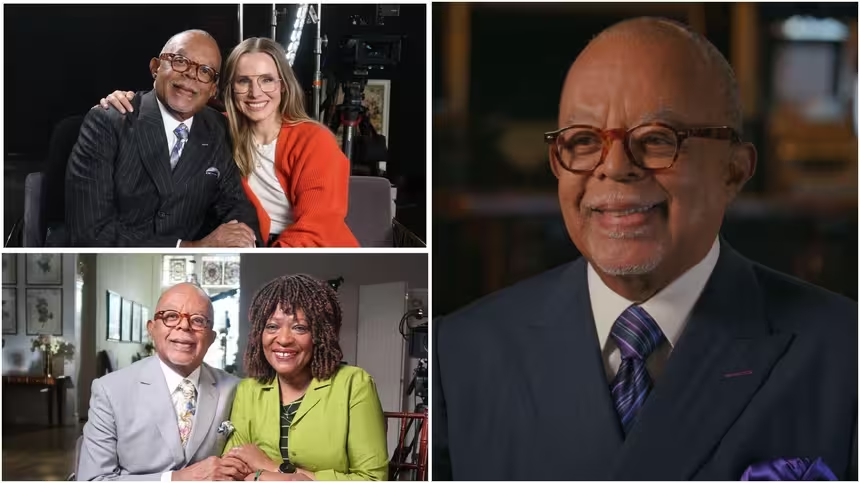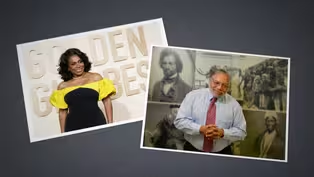Finding Your Roots
Lonnie Bunch Discovers His Grandfather's Heroic Educationonal Efforts
Clip: Season 11 Episode 9 | 3m 41sVideo has Closed Captions
Lonnie learns about his grandfather who served on a school committee for mainly Black students.
Lonnie learns about his grandfather Jesse who served on a school committee for the local school of Black students. However, his role was eventually terminated during the rise of Jim Crow, and he ended up purchasing his own farmland, the same land that Lonnie visited in his teenage years.
Problems playing video? | Closed Captioning Feedback
Problems playing video? | Closed Captioning Feedback
Corporate support for Season 11 of FINDING YOUR ROOTS WITH HENRY LOUIS GATES, JR. is provided by Gilead Sciences, Inc., Ancestry® and Johnson & Johnson. Major support is provided by...
Finding Your Roots
Lonnie Bunch Discovers His Grandfather's Heroic Educationonal Efforts
Clip: Season 11 Episode 9 | 3m 41sVideo has Closed Captions
Lonnie learns about his grandfather Jesse who served on a school committee for the local school of Black students. However, his role was eventually terminated during the rise of Jim Crow, and he ended up purchasing his own farmland, the same land that Lonnie visited in his teenage years.
Problems playing video? | Closed Captioning Feedback
How to Watch Finding Your Roots
Finding Your Roots is available to stream on pbs.org and the free PBS App, available on iPhone, Apple TV, Android TV, Android smartphones, Amazon Fire TV, Amazon Fire Tablet, Roku, Samsung Smart TV, and Vizio.
Buy Now

Explore More Finding Your Roots
A new season of Finding Your Roots is premiering January 7th! Stream now past episodes and tune in to PBS on Tuesdays at 8/7 for all-new episodes as renowned scholar Dr. Henry Louis Gates, Jr. guides influential guests into their roots, uncovering deep secrets, hidden identities and lost ancestors.Providing Support for PBS.org
Learn Moreabout PBS online sponsorship"We urge the appointment of white committeemen for each colored school in Bertie County.
We urge the complete taking charge by white men of every public agency in the county.
The school committeemen really spend the school's money, the white people raise the school's funds, the Negroes pay little of it.
The white people demand to know what goes with their taxes.
They're getting very sore over having any of it educate the Negro.
White men should supervise the spending of the taxes.
Give us none but white committeemen for every school."
Good gracious.
What's it like to read that?
In some ways what it does is make something that you know as a historian, real.
Yeah.
And concrete, right?
I felt the same way.
You know.
How dare you spend any money for those folks unless we control it.
Yeah, isn't that cold?
Oh.
This article did not represent an isolated opinion.
Eight months earlier, heavily armed bands of white supremacists had besieged Wilmington, North Carolina, murdering Black people and burning down their businesses.
So what do you think Jesse was thinking when he joined that school board?
That's what I'm so moved by is the courage and the sense of willingness to sacrifice for the greater good.
You had to know that you were putting yourself and your family at risk.
That, you know, the notion of staying below the firing line, yet here is somebody stepping above it, saying this is too important.
And I just can't imagine what courage that took.
I wish I could hear the conversations he and his wife had about these choices that he would make.
And I bet his wife was saying, "Stay on the farm!"
You know?
That's right.
"You know how crazy these-" That's right.
"Ku Klux-ers are."
Jesse was appointed to the committee for a term of two years, but by the time those two years were up, Jim Crow was firmly entrenched in North Carolina, and it seems that Jesse never had the opportunity to serve again.
But even so, Lonnie's ancestor did not slow down.
In 1902, Jesse purchased 75 acres of land and made the most of them.
When you were a child, your grandparents still owned property from that very purchase.
Really?
Yes!
You visited that land, you played on it.
And you chopped cotton on it.
Wow.
So maybe I should have been a better chopper then, you know?
But that's amazing to me that- I'm just trying to get my head around what it would take to believe you could do that.
Right.
And then to do it.
Right.
And boy, I could see though that's also why you're a leader, because you're trying to lead to help people understand how important education is, how important it is to own your own land.
Can you imagine what Jesse would've thought knowing he was buying something that would shape his family for generations?
You know, there's a part of me that hopes he had that vision.
Of recognizing that what he was going to do was to touch people yet unborn.
And I think that that's at least the way I'm gonna think about it, because I think that clearly the way he thought about education, the way he thought about land ownership, he was really recognizing that he could change the trajectory of a family by those actions.
Video has Closed Captions
Preview: S11 Ep9 | 30s | Henry Louis Gates, Jr. maps the roots of actor Sheryl Lee Ralph & historian Lonnie Bunch. (30s)
The Surprising Love Story in Sheryl Lee Ralph's Ancestry
Video has Closed Captions
Clip: S11 Ep9 | 4m 9s | Sheryl's third great grandparents, a mixed race couple, got married in 1837. (4m 9s)
Providing Support for PBS.org
Learn Moreabout PBS online sponsorship

- History
Great Migrations: A People on The Move
Great Migrations explores how a series of Black migrations have shaped America.












Support for PBS provided by:









